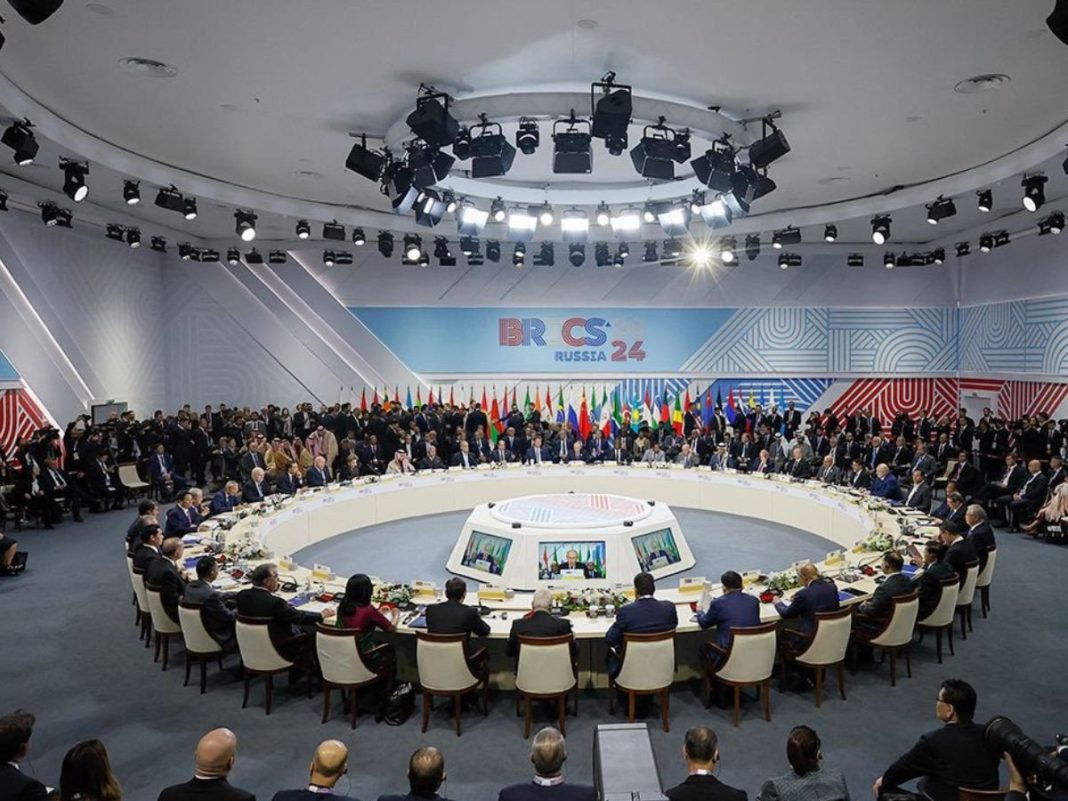DM Monitoring
LAHORE: As the world frays under trade wars, resource conflicts and the US credibility unravels under the weight of its own aggressive exceptionalism, BRICS declared that the emperor has no clothes and the Global South was done waiting for crumbs from imperial banquet tables.
Held under the shadow of US belligerence and amid fresh wounds inflicted by wars equipped and backed by the West, the bloc’s latest summit took on the air of a reawakened Non-Aligned Movement, with Brazilian President Luiz Inácio Lula da Silva asserting the Washington must stop “behaving like an empire and “begin respecting the sovereignty of others”.
His response came in response to US Donald Trump’s renewed tariff theatrics in the wake of the bloc’s asserting of its sovereignty.
The alliance’s leaders reaffirmed their commitment to multilateralism, sovereign equality and a restructuring of global governance to reflect a “new multipolar reality.”
In a joint declaration the bloc warned that rising protectionism threatened global trade and called for reforms of institutions like the UN Security Council and the IMF so they better reflect emerging economies. The declaration was unusually muscular and named the reality of Gaza as a “war of aggression” and condemned tactics such as starvation sieges that even NATO countries tiptoe around.
Furthermore, it strongly backed Palestinian self-determination and expressing “grave concern” over Israel’s Gaza war and reiterating support for a Palestinian state within 1967 borders. The declaration also denounced the US–Israeli bombing of Iran’s nuclear sites as a “violation of international law”. Blasting trade wars, the communique took aim at “unilateral tariff…barriers” that “flout WTO regulations”. One major theme at Rio was financial autonomy.
Rio’s leaders agreed to build out practical infrastructure for cross-border payments in local currencies and endorsed a BRICS Cross-Border Payments Initiative – an alternative to SWIFT – to make trade faster and safer within the bloc. The system, spearheaded by the New Development Bank (NDB), aims to interconnect national payment platforms so that goods can be settled directly in, say, rupees for goods from Brazil, or yuans for contracts with China.
Climate change was another urgent focus, especially with Brazil hosting the upcoming COP30 climate conference. The BRICS ministers used Rio to outline a “climate geopolitics” agenda grounded in justice and development. They insisted that environmental policy cannot be separated from social welfare.
Another key demand was massive climate financing. BRICS leaders noted developed countries had pledged US$100 billion per year by 2020, but actual flows remain far below need.
They cited data showing climate finance requirements have soared to about $1.3 trillion (due to worsening impacts), while only a fraction of that is funded.
As Ethiopia’s ambassador warned in Rio, the 2030 development goals were way off track, and “only about 17% of the goals are on track”. His plea was blunt: rich countries caused the bulk of emissions since the Industrial Revolution, yet poor nations bear the worst consequences.
The bloc cast climate change as a development and justice issue, not just an environmental problem. It demands that wealthier nations deliver on past commitments and scale them up dramatically.
Looming behind all the summit talk was a critique of the existing financial order – in essence, an indictment of the Western-led model of capitalism. BRICS leaders and allied thinkers pointed out how that model has pitted developing countries on the losing end of debt, austerity and austerity.
For many in the Global South, today’s “free market” prescriptions have brought crisis after crisis.
Moreover, IMF and World Bank have compounded a “polycrisis” of hunger, climate, and debt by imposing punitive conditions and surcharges on vulnerable countries.
For example, the IMF’s insistence on cutting subsidies or raising interest rates forced Egypt to quadruple bread prices, sparking unrest, even as the IMF simultaneously imposed “junk fees” (surcharges) that extra-burdened already cash-strapped governments.
The numbers are stark. Debt justice advocates note that over half of the world’s poorest countries are now in debt crisis. Since 2013 the number of Global South nations on the verge of default has more than doubled. As of 2022, 54 countries were classified as facing unsustainable debt burdens.
In these countries, interest payments are crowding out everything else, Recent research finds they now spend five times more on repaying creditors than on climate adaptation and resilience. In other words, money that could build hospitals or flood defence is siphoned off to foreign banks and bondholders.
For instance, Pakistan, hit by devastating floods in 2022, was forced to divert billions from reconstruction to service external debt even as development benchmarks languished



